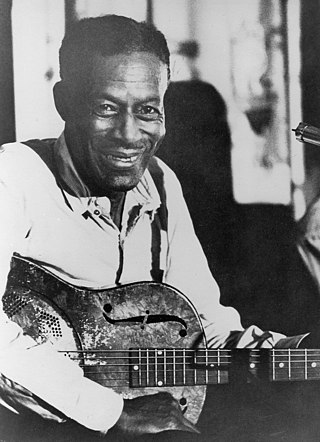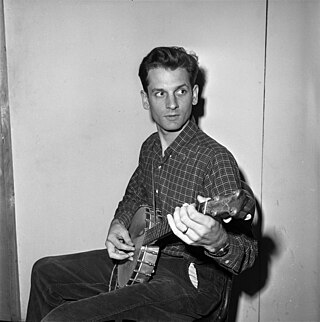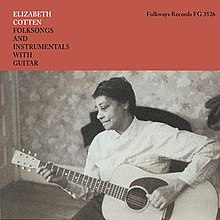
Huddie William Ledbetter, better known by the stage name Lead Belly, was an American folk and blues singer notable for his strong vocals, virtuosity on the twelve-string guitar, and the folk standards he introduced, including his renditions of "In the Pines", "Goodnight, Irene", "Midnight Special", "Cotton Fields", and "Boll Weevil".

Edward James "Son" House Jr. was an American Delta blues singer and guitarist, noted for his highly emotional style of singing and slide guitar playing.

Anthology of American Folk Music is a three-album compilation, released in 1952 by Folkways Records, of eighty-four recordings of American folk, blues and country music made and issued from 1926 to 1933 by a variety of performers. The album was compiled from the experimental film maker Harry Smith's own personal collection of 78 rpm records.

Jean Ruth Ritchie was an American folk singer, songwriter, and Appalachian dulcimer player, called by some the "Mother of Folk". In her youth she learned hundreds of folk songs in the traditional way, many of which were Appalachian variants of centuries old British and Irish songs, including dozens of Child Ballads. In adulthood, she shared these songs with wide audiences, as well as writing some of her own songs using traditional foundations.

Mike Seeger was an American folk musician and folklorist. He was a distinctive singer and an accomplished musician who mainly played autoharp, banjo, fiddle, dulcimer, guitar, harmonica, mandolin, dobro, jaw harp, and pan pipes. Seeger, a half-brother of Pete Seeger, produced more than 30 documentary recordings, and performed in more than 40 other recordings. He desired to make known the caretakers of culture that inspired and taught him. He was posthumously inducted into the International Bluegrass Music Hall of Fame in 2018.

Elizabeth "Libba" Cotten was an influential American folk and blues musician. She was a self-taught left-handed guitarist who played a guitar strung for a right-handed player, but played it upside down. This position meant that she would play the bass lines with her fingers and the melody with her thumb. Her signature alternating bass style has become known as "Cotten picking". NPR stated "her influence has reverberated through the generations, permeating every genre of music."

Paul Clayton was an American folksinger and folklorist who was prominent in the folk music revival of the 1950s and 1960s.
"The Maid Freed from the Gallows" is one of many titles of a centuries-old folk song about a condemned maiden pleading for someone to buy her freedom from the executioner. Other variants and/or titles include "The Gallows Pole", "The Gallis Pole", "Hangman", "The Prickle-Holly Bush", "The Golden Ball", and "Hold Up Your Hand, Old Joshua She Cried." In the collection of ballads compiled by Francis James Child in the late 19th century, it is indexed as Child Ballad number 95; 11 variants, some fragmentary, are indexed as 95A to 95K. The Roud Folk Song Index identifies it as number 144.
Smithsonian Folkways is the nonprofit record label of the Smithsonian Institution. It is a part of the Smithsonian's Smithsonian Center for Folklife and Cultural Heritage, located at Capital Gallery in downtown Washington, D.C. The label was founded in 1987 after the family of Moses Asch, founder of Folkways Records, donated the entire Folkways Records label to the Smithsonian. The donation was made on the condition that the Institution continue Asch's policy that each of the more than 2,000 albums of Folkways Records remain in print forever, regardless of sales. Since then, the label has expanded on Asch's vision of documenting the sounds of the world, adding six other record labels to the collection, as well as releasing over 300 new recordings. Some well-known artists have contributed to the Smithsonian Folkways collection, including Pete Seeger, Ella Jenkins, Woody Guthrie, and Lead Belly. Famous songs include "This Land Is Your Land", "Goodnight, Irene", and "Midnight Special". Due to the unique nature of its recordings, which include an extensive collection of traditional American music, children's music, and international music, Smithsonian Folkways has become an important collection to the musical community, especially to ethnomusicologists, who utilize the recordings of "people's music" from all over the world.
"Rock Island Line" is an American folk song. Ostensibly about the Chicago, Rock Island and Pacific Railroad, it appeared as a folk song as early as 1929. The first recorded performance of "Rock Island Line" was by inmates of the Arkansas Cummins State Farm prison in 1934.

Not for Kids Only is an album of children's songs released by Jerry Garcia and David Grisman. Most of the songs come from the Southeast region of the United States. It was released by Acoustic Disc.

Contemporary folk music refers to a wide variety of genres that emerged in the mid 20th century and afterwards which were associated with traditional folk music. Starting in the mid-20th century, a new form of popular folk music evolved from traditional folk music. This process and period is called the (second) folk revival and reached a zenith in the 1960s. The most common name for this new form of music is also "folk music", but is often called "contemporary folk music" or "folk revival music" to make the distinction. The transition was somewhat centered in the United States and is also called the American folk music revival. Fusion genres such as folk rock and others also evolved within this phenomenon. While contemporary folk music is a genre generally distinct from traditional folk music, it often shares the same English name, performers and venues as traditional folk music; even individual songs may be a blend of the two.
"The Ballad of Casey Jones", also known as "Casey Jones, the Brave Engineer" or simply "Casey Jones", is a traditional American folk song about railroad engineer Casey Jones and his death at the controls of the train he was driving. It tells of how Jones and his fireman Sim Webb raced their locomotive to make up for lost time, but discovered another train ahead of them on the line, and how Jones remained on board to try to stop the train as Webb jumped to safety. It is song number 3247 in the Roud Folk Song Index.
"Freight Train" is an American folk song written by Elizabeth Cotten in the early 20th century, and popularized during the American folk revival and British skiffle period of the 1950s and 1960s. By Cotten's own account in the 1985 BBC series Down Home, she composed "Freight Train" as a teenager, inspired by the sound of the trains rolling in on the tracks near her home in North Carolina.

The Lost Topic Tapes: Cowes Harbour 1957 is an album by American folk musician Ramblin' Jack Elliott, released in 2004. Elliott recorded a number of albums on the Topic label in London in the 1950s. The songs on this compilation are taken from rediscovered tapes found in the British Library in London. They were recorded on a yacht at Cowes Harbour in 1957. Several songs were issued in Britain on Jack Takes the Floor.
"Cumberland Gap" is an Appalachian folk song that likely dates to the latter half of the 19th century and was first recorded in 1924. The song is typically played on banjo or fiddle, and well-known versions of the song include instrumental versions as well as versions with lyrics. A version of the song appeared in the 1934 book, American Ballads and Folk Songs, by folk song collector John Lomax. Woody Guthrie recorded a version of the song at his Folkways sessions in the mid-1940s, and the song saw a resurgence in popularity with the rise of bluegrass and the American folk music revival in the 1950s. In 1957, the British musician Lonnie Donegan had a No. 1 UK hit with a skiffle version of "Cumberland Gap".
"Cripple Creek" is an Appalachian-style old time tune and folk song, often played on the fiddle or banjo, listed as number 3434 in the Roud Folk Song Index.
Folkways Records was a record label founded by Moses Asch that documented folk, world, and children's music. It was acquired by the Smithsonian Institution in 1987 and is now part of Smithsonian Folkways.

Today! is the second studio album, but third body of work recorded by folk/country blues musician Mississippi John Hurt. It was released in 1966 by Vanguard Records. This album contains some of the first commercial material recorded after his "rediscovery" in 1963, and is the first he recorded for Vanguard. The album spans several genres and styles of music, ranging from traditional blues and folk songs, to country, to African-American spirituals. Along with Hurt's two previous releases, Today! helped to reveal his work to a wider folk audience. In 2009, the album was one of the twenty-five selections that were added to the Library of Congress' National Recording Registry.
"Freight Train Blues" is an early American hillbilly-style country music song written by John Lair. He wrote it for Red Foley, who recorded the song with the title "I Got the Freight Train Blues" in 1934. The tune was subsequently recorded by several musicians, with popular renditions by Roy Acuff in 1936 and 1947. Bob Dylan later adapted it for his self-titled debut album (1962).











